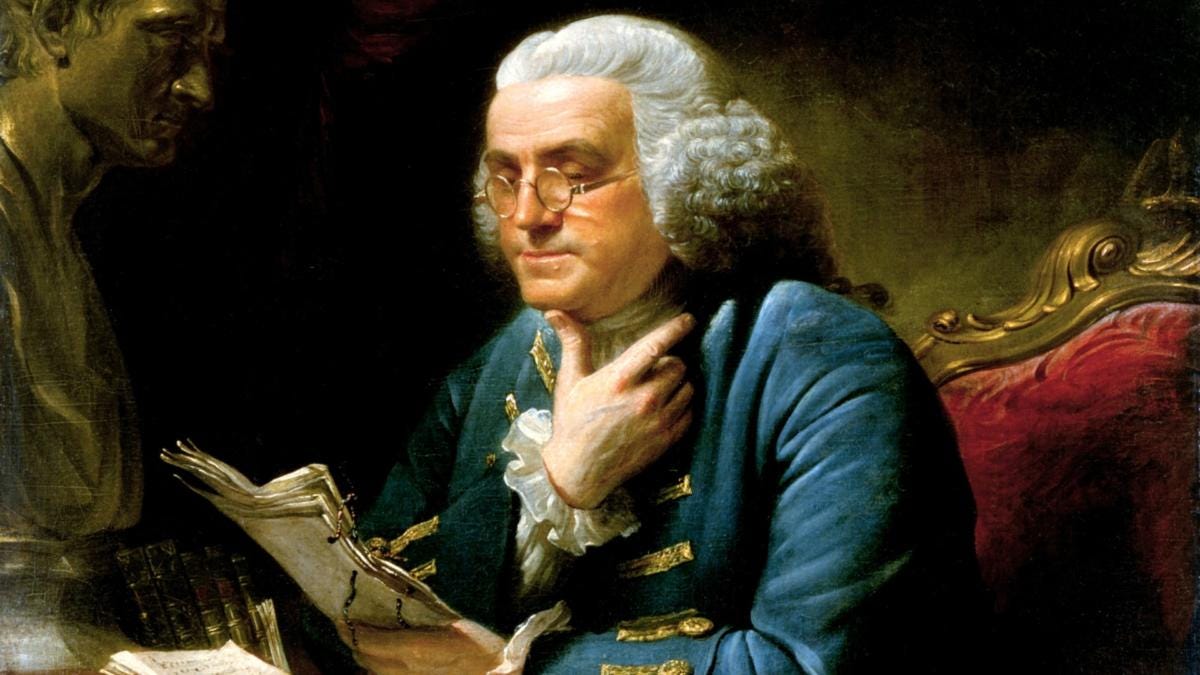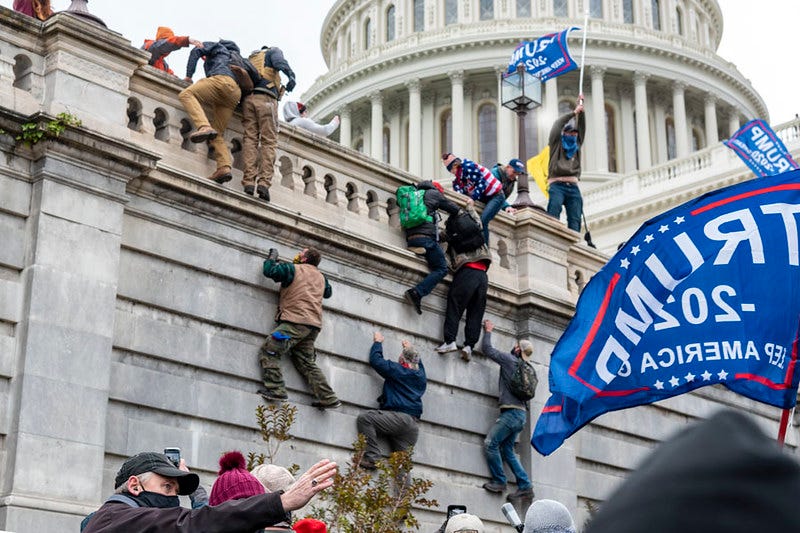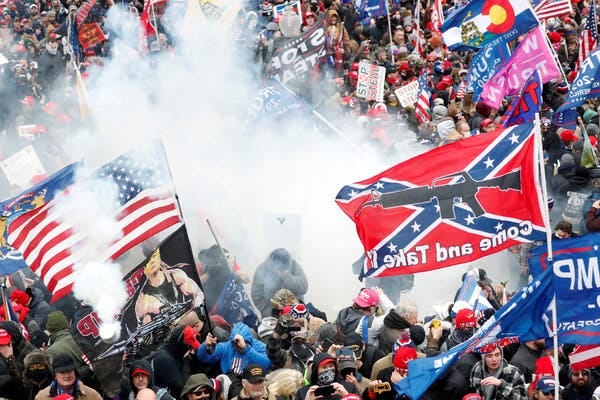In the late 18th Century, not long after the Constitutional Convention of 1787 to be exact, Philadelphia socialite Elizabeth Willing Powell posed the following question to Dr. Benjamin Franklin, a friend of hers and one of the Founding Fathers of what is now the United States: "Well, Doctor, what have we got, a republic or a monarchy?" Franklin curtly replied, "A Republic, if we can keep it!"
Depiction of Benjamin Franklin
During the Colonial era, just about all of the European colonists up and down the Eastern Seaboard had fled Europe to pursue life away from the control of monarchies in England and to a lesser extent, France, Spain, and Holland. Lest we forget that the Declaration of Independence, drafted by lawyer (and future president) Thomas Jefferson in 1776, was essentially a manifesto of grievances against the tyrannical control of King George III!
Eleven years later, in 1787, another lawyer and future president, James Madison, was the primary draftsman of the Constitution, a document that borrowed concepts from England's Magna Carta that had been the codified law of the British realm since 1215, but a new one that, in theory, was broader in scope by endowing citizens, which at that time ONLY meant white men, with the power to elect leaders for the Executive and Legislative Branches—with the former endowed with the right to nominate judges who would then be confirmed following the advice and consent of the Senate chamber within the latter.
This system, by design, was to ensure "checks" and "balances" among the three branches of federal government to prevent tyranny because, once again, those early American Colonizers were very well aware of the dangers of absolute power centralized into the hands of one all powerful man or woman. Thus, Ms. Powell's question to Ben Franklin about the results of Constitutional Convention and, thus, his famous reply that we would have a Republic so long as we can keep it.
Alas, as of today, one could credibly argue that the Republic, at least with respect to checking the Executive Branch, is no more!
Surely, if I could resurrect Ben Franklin right this moment and invite him over for a cup of coffee, I would begin by asking whether today's Supreme Court ruling, one which provides former President Donald Trump immunity from being prosecuted for the"official acts" that led to the MAGA riots on January 6, 2021, means that the "Republic," specifically its Chief Executive, is now a monarch with the unquestionable authority that vexed the Founding Fathers during their day?
Methinks his answer would be, "yes," the Supreme Court has created a problem that will have to be solved down the line by a successor civil court, at best, or uncivil hostilities, at worst.
I will not waste precious words in today's blog rehashing all of the events that got us to this point, but to summarize, the undisputed facts remain that then President Donald Trump knew by the second week of December in 2020 that he had lost the election to Democratic challenger Joe Biden. But the petulant former president spent the next several weeks filing lawsuits that were struck down en masse by federal and state courts across the country (totally legal), while using his voice and social media platforms to encourage Republican politicians and followers to deny Biden's victory by any means necessary—even up to violent force (totally illegal).
January 6th
The result was a quagmire of epic proportions on January 6, 2021, the date that the Electoral College results were certified, that found thousands of Trump supporters—at their leader's behest—descending upon the Capitol Complex to, as he shouted at the rally, "Stop the Steal" of the 2020 election. In fact, from his own speech and deposition testimony from key witnesses since January 6th, it has been proven beyond all doubt that Trump had intended to lead the MAGA mob to the Capitol that day—but was only prevented by Secret Service agents who were gravely concerned for his physical safety. Nevertheless, when the smoke cleared, five people were killed, multiple politicians, including then VP President Mike Pence, fled in fear for their lives, and over $50 million in property damage resulted from Trump's refusal to concede that he had lost the election fair and square.
Today, the United States Supreme Court's 6-3 decision along ideological lines has determined that presidents have absolute immunity for actions that fall within the “core responsibilities of their office—and are presumptively immune for all other official acts.” The Court, one that has six conservative members (three of whom were appointed by Donald Trump), has remanded this case back to the U.S. District Court (led by Judge Tanya Chutkan) to determine whether Trump's demands that VP Pence and state level Republican officials decertify the 2020 election, or "find the votes" to overturn the lawful results as he was recorded saying, was a part of his "core responsibilities of office" or official acts.
Chief Justice John Roberts, writing on behalf of the conservative majority, held, “The president therefore may not be prosecuted for exercising his core constitutional powers, and he is entitled, at a minimum, to a presumptive immunity from prosecution for all his official acts...that immunity applies equally to all occupants of the Oval Office, regardless of politics, policy or party.”
January 6th
While my trained legal mind fully understands what the conservative majority has concluded, my trained historical mind recognizes the deep flaws in even tacitly concluding that Trump's acts to stop the peaceful and lawful transition of power from his administration to the next one were constitutional. I mean, seriously, how in the heck can acts that contravene the Constitution be deemed constitutional?
When we think back on the past sixty years, there have been so many criminal and/or bad acts committed by sitting presidents that were not charged in courts of law, but the American people at least understood that such charges COULD be brought and serve as a deterrent to corral some of the worst instincts in later presidents and presidential aspirants.
But seriously, under today's ruling, perhaps Richard Nixon shouldn't have resigned for ordering the Watergate burglaries at Democratic Party headquarters? Perhaps Ronald Reagan was well within his constitutional powers to authorize illicit arms sales to the Contras in Nicaragua? Perhaps Bill Clinton should not have been forced to testify about his extramarital dalliances, including one with Monica Lewinsky that led to perjury charges, impeachment hearings, and his disbarment, being absolutely immune and whatnot from questioning from we, the people, and whatnot?
Again, while none of the aforementioned sitting presidents were charged with crimes, the possibility that they "could" be charged separate and distinct from impeachment proceedings at least kept the ideal of a president who was not an absolute monarch alive—per the Founding Fathers desires—even if the ideal may have been illusory all along!
Associate Justice Sonia Sotomayor echoed these concerns in her dissent, warning against a “king above the law” while arguing, "Today’s decision to grant former presidents criminal immunity reshapes the institution of the presidency.” Sotomayor added, “it makes a mockery of the principle, foundational to our Constitution and system of government, that no man is above the law…The court effectively creates a law-free zone around the president, upsetting the status quo that has existed since the founding.”
While I am disappointed in today's ruling, I am not in the least bit surprised because throughout my life and careers, I've recognized that there are two sets of rules in America—one for the privileged patrician elite, and one for everyone else. It doesn't matter whether it was Democratic nominee Hillary Clinton getting a pass from the Justice Department in 2016, or Republican nominee Donald Trump getting a pass from the Supreme Court in 2024, the RULES ARE DIFFERENT when you are a member of the club with financial projection for protection.
But the question that begs asking is when will we, the people, stop and collectively ask "why" the rich and famous get passes that everyday working folks do not? Specifically, why is Trump about to receive a pass for pushing his followers up to commit the vile and violent acts that they did on January 6th—with some already serving long prison stretches for following their president's demands?
January 6th
In the end analysis, the rich and the famous, be they Republican or Democrat, are only one to two percent of the population, which means that the 98 percent of the rest of us have ALL of the power to demand equal accountability and equal justice under the law. And while some may suggest that my angst this day stems from my dislike of Donald Trump’s politics, I would rebut by reminding that the office of the president is far more important than the former or even the current occupant, and that it is critically important for people with sound minds and judgment to recognize grievous, criminal errors when they are committed by presidential occupants during their occupancy—and work to hold them accountable by any and all legal means necessary!
To conclude, sadly, what Ms. Powell, the 17th Century socialite, and Benjamin Franklin could not have foreseen is that a day would come when we, the people, are so enamored with the lifestyles of the rich and famous that we collectively give them passes to do whatever they like whenever they like it—even if it means that a president now has all of the privileges and protections of an absolute monarch, which runs counter to the Constitution’s original design and intent.
Shame on us...








SIX RAT BASTARDS.
The levels of corruption in this country is being exposed day by day. This kangaroo court didn’t account for what their ruling could even do to themselves in giving that type of power to executive branch.